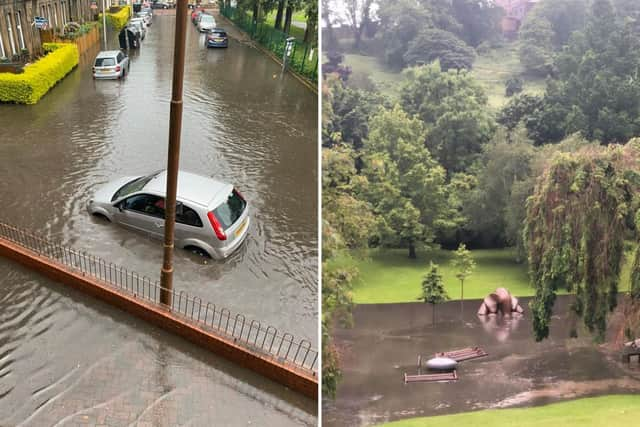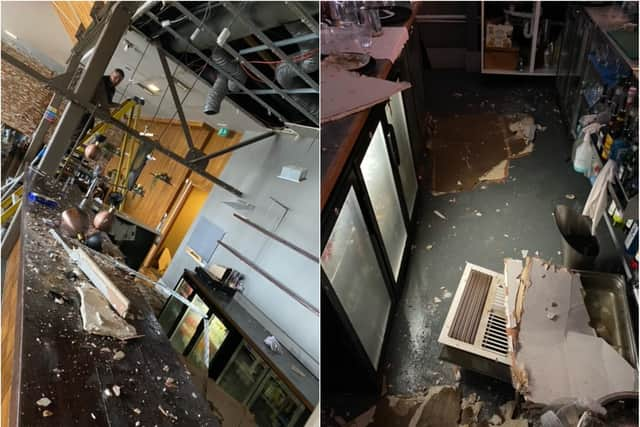Edinburgh flooding: 'We are going to see more of these extreme events' says climate expert
Extreme weather events like the flash flooding in Edinburgh at the weekend will become more common as the climate crisis unfolds.
That’s according to a climate change researcher, after the Capital recorded half the rainfall for July in just an hour on Sunday (June 4).
Advertisement
Hide AdAdvertisement
Hide AdPerhaps more shocking is new research* shows 50mm of rainfall in a day is a one in a hundred year event in Edinburgh. But on Monday 40mm fell in just an hour at the Botanical Gardens.


"We are going to see more of these extreme events so we need to take some action,” said Dr Kate Crowley, co-director of the Edinburgh Climate Change Institute (ECCI).
Whole streets went underwater, homes and business premises were flooded in the deluge as a thunderstorm struck on Sunday afternoon, and heavy rainfall persisted on Monday. The city’s newly-opened St James Quarter was flooded and waterfalls poured over streets in what some described as ‘biblical’ weather.
"We are likely to experience more of this kind of intense, extreme events due to climate change in the future,” says Dr Crowley.


‘There’s a real danger to human lives if adaptation is not embraced’
Dr Crowley points to research by one of her students, who is studying extreme precipitation risk in the Edinburgh area.
Shane O’Neill says the weather on Sunday and Monday was “extraordinary” in the amount of rainfall that fell in such a short time.
And the sheer amount of rain could get worse if we don’t do something about it.


Rainfall levels during events like this could potentially increase by 20 to 50 per cent in the Greater Edinburgh region in future, his research shows.
Advertisement
Hide AdAdvertisement
Hide AdOf particular concern are the autumn and winter seasons, where we could see extreme rainfall events increase greater than 50 per cent in the 2030s and 2070s.
But these strong, intense downpours could also become more prevalent in summer months due to a warming atmosphere.
Shane says: “The general message is worrying and highlights a real danger to physical infrastructure and, quite frankly, human lives if adaptation is not embraced as soon as possible.”
A rise in extreme weather events
While it’s not clear if the weather event on Sunday was a direct result of human-induced climate change (attributing such things is an evolving science, Dr Crowley says), what is clear is it will happen more often, and more severely.
Dr Crowley says: "That amount of rain in a period of time causes the problem, especially in cities where we have tarmac-ed everything so it’s very difficult for rain to seep into the ground.
"You get surface water flooding when it rapidly flows off, there’s almost too much water for the drainage systems to manage. They’re not designed to absorb so much of this water so quickly. It just runs through the streets.”
Maintenance and drainage are essential to manage this situation, Dr Crowley says. “We need to see if we can adapt our city to manage these kind of events.
"But also making sure new builds take into account these possible changes due to climate change.
Advertisement
Hide AdAdvertisement
Hide Ad“We know that these events are going to happen again in the future so it’s about preparing as best as you can now.”
There has been an increase in rainfall in Scotland in the past few decades – with an increasing proportion coming from extreme weather events, according to UKCP (UK Climate Projections).
This millennium has seen rising temperatures, heavier downpours, more flooding and rising sea levels threatening coastal communities.
But what can be done about it and what is already being done?
Dr Crowley says local authorities like Edinburgh City Council are already doing a lot of good work, but need more financial support.
"That needs to come from central government and big political change,” she says, pointing out events like COP26, the UN climate summit to be held in Glasgow this November.
"It’s about changing how we behave and how we prepare and respond to the impacts of climate change we are likely to see in the future.
"It’s things like educating the public not to walk through flood waters as it’s very dangerous. We need flood defences to reduce the risk from these kind of hazards.”
Edinburgh City Council is currently working towards a net zero city by 2030, with its draft Climate Strategy currently out for consultation.
Advertisement
Hide AdAdvertisement
Hide AdThe city’s Transport and Environment Committee vice-convener Karen Doran said: “There’s a lot we are doing here in the Capital to meet our climate targets including adapting to and managing the inevitable effects of a changing climate.”
That includes new strategies to enhance drainage, improve flood defences and promote biodiversity, with climate change risk and adaptation embedded into planning policies.
“This will help ensure future development is resilient to climate change and that our young people inherit a thriving, sustainable city which is a cleaner and healthier place to live and work.”
‘I feel quite hopeful’
Despite some very worrying projections, Dr Crowley says she feels “quite positive” about things.
She says: "I have worked in adaptation for a long time and never before have I seen the appetite that we have at the moment to get stuff done.
"Never before have we had politicians on board and everyone saying we have a serious problem and we need to address it.
"I’m no longer having to persuade people that it’s important. I feel quite hopeful.”
*Shane O’Neill’s dissertation is ‘Extreme precipitation risk and climate change impact assessment for Edinburgh World Heritage sites’
A recent climate risk assessment for Scotland was published in June by UK Climate Risk
Comments
Want to join the conversation? Please or to comment on this article.
